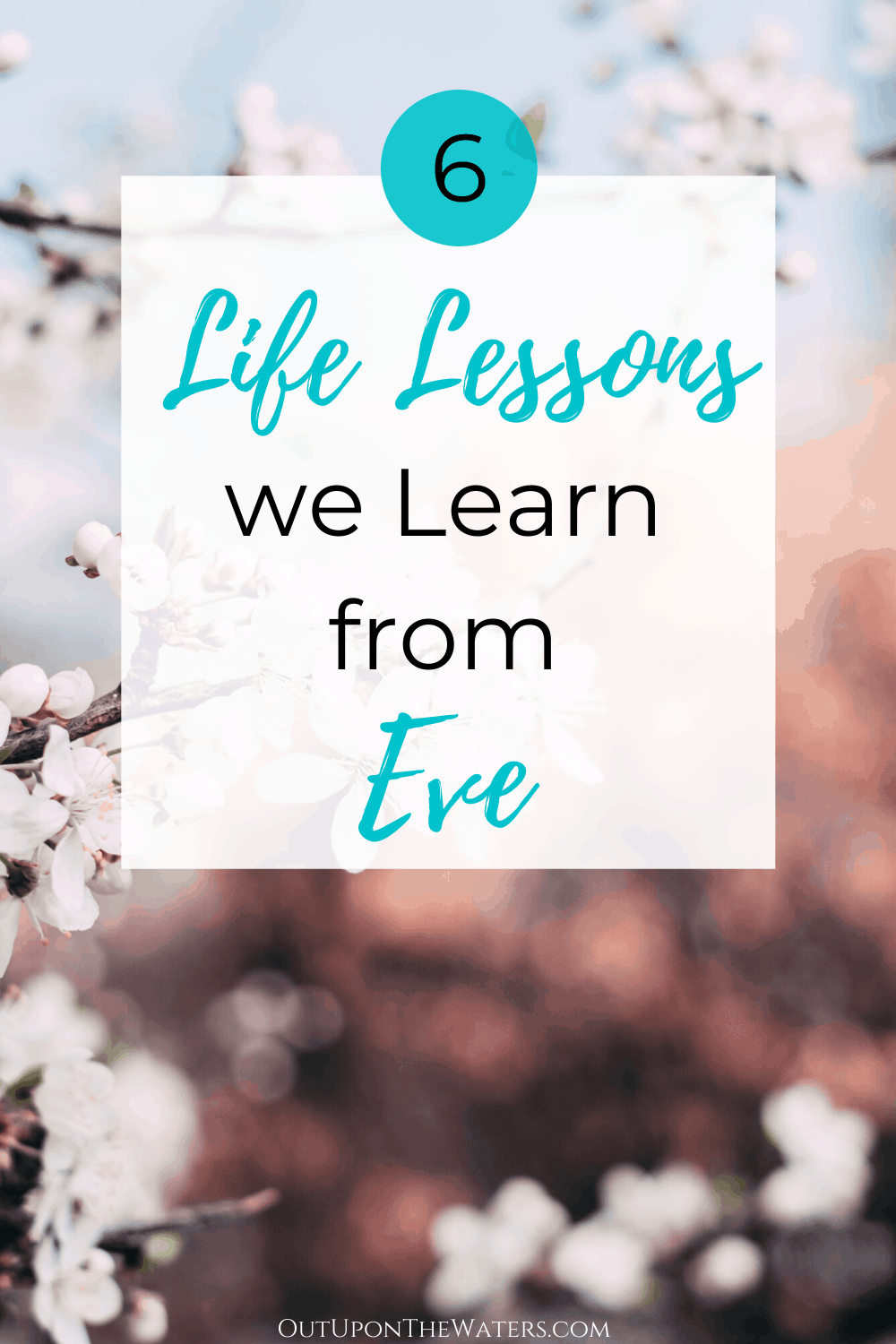The story of Eve is typically taken as an account of where the first human beings went wrong.
Eve messed it all up for the rest of us, right?
(Don't forget that Adam had some responsibility too.)
But Eve is more than just the first woman to get it wrong. She isn't just the One Who Messed Up.
She is, fundamentally, a picture of all of us, a picture of our moments of doubt and our moments of anxiety. And what we learn in the story of Eve is that these things don't have to define us.
God shows us, in Eve, how we can rest in Him in our greatest moments of need.

1. Focus on the good around you.
Eve had the perfect surroundings, perfect relationships, and perfect provisions. She needed nothing. She literally lived in Paradise.
And yet, Eve chose to focus on the one thing that she couldn't have: the fruit from the tree of knowledge of good and evil.
Eve became disillusioned with the one thing that she did not have, and she chose to step outside of the will of God.
This is what resulted in the Fall. It was fundamentally an act of disobedience, but it was prompted by Eve focusing on what she didn't have.
The same is true for us. How tempting is it to focus on that one thing that you don't have that others do? The perfect job, the perfect spouse, the perfect house....
Your life might be amazingly awesome, but there's just one thing that drives you crazy, that makes you feel inadequate, that makes you envious of someone else.
What we learn from Eve is that we ought to focus on the good around us, and not that one thing that we don't have.
2. Don't doubt what God had once told you.
Eve took her eyes off the ball.
It was a forgivable error. (God in fact forgave this error by becoming incarnate and dying on the cross in order to reconcile us to Him).
She's only human, after all. And her error was to doubt the Word of God. It's so easy to doubt something that we once heard, isn't it?
Sure, I thought that then. But now....
Am I sure that's the right choice? Am I sure that I'm remembering correctly? Am I sure that that's what God really said?
Eve doubted what God had once told her.
"You may freely eat the fruit of every tree in the garden - except the tree of the knowledge of good and evil. If you eat it's fruit, you are sure to die" (Genesis 2:16-17).
When she encounters the serpent, he asks her, "Did God really say you must not eat the fruit from any of the trees in the garden?" (Genesis 3:1)
Did God really say that?
How easy it is to doubt what we were once sure that God had told us.
I know that I've certainly been through this. After making a fairly major decision quite recently, after many hours of trying to discern God's will, I was plagued with doubt. Was I sure that this is what God wants me to do? Is this really the right decision? Really?
A friend reminded me of Eve and that Satan wants us to doubt what we were once sure that God had told us.
The lesson: Don't doubt what you were once sure that God had told you.

3. Focus on God's Word
Jesus underwent the same sort of temptations as did Eve, only He did not succumb to them.
Why? Besides the fact that He was God incarnate, there was also this: when Jesus was tempted by Satan, he backed up and focused on the Truth, on God's Word.
God Himself shows us a reliable way to defeat temptation and to rest assured in our decisions: focus on His Word.
Eve was tempted by physical pleasure (eating the apple), material possessions - or materialism - (wanting to possess something beautiful), and the desire for significance.
"She saw that the tree was beautiful and its fruit looked delicious, and she wanted the wisdom it would give her. So she took some of the fruit and ate it" (Genesis 3:6).
She saw something that she wanted, so she took it. She wanted to be wise, to be able to determine what was right and what was wrong for herself (instead of obeying her Creator).
This lead to her downfall.
Jesus, when he was tempted in the desert by Satan, by contrast, refused to give in and instead quoted Scripture.
He refused to turn a stone into bread and insisted that people do not live by bread alone (Matt. 4:4; Jesus cites Deut. 8:3).
He refused to jump off of the highest point of the Temple (Satan said that he would be rescued by angels), citing Deut 6:16: "You must not test the Lord your God" (Matt. 4:7).
Finally, he refused Satan's offer wealth and power, citing Deut. 6:13: "You must worship the Lord your God and serve only Him' (Matt. 4:10).
Since the first 5 books of the Old Testament (the Pentateuch) were the only Scripture that Jesus had available, this is what he drew on.
Jesus shows us that when we turn to the Word of God, when we are so steeped in it that we have it at our fingertips, then we have a reliable source of Truth that we can use to help guide us through life.
This can help us tremendously in times of doubt as well. God often speaks to us through the Bible, and having Scripture at your fingertips can help you to trust in what God has told you.
4. Don't try to control everything.
The fundamental problem for Eve was that she wanted to determine what was right and what was wrong, instead of obeying her Creator.
She wanted to wield power over God, to usurp the position of the Creator, and to set herself up as her own standard of truth.
How often are we taught to do this today? We are taught that we all have our own truth, that what's true for you may not be true for me, that we get to determine for ourselves who we are, what are place in the world is, and where we belong.
This is fundamentally unbiblical.
Eve, as a created being, is by her very nature dependent on her Creator. She is not sovereign. She doesn't get to determine everything.
But she wants wisdom, knowledge, and control.
The fact is that when we try to control everything, to determine everything for ourselves as though we are the very measure of right and wrong, of good and evil, of true and false, then we are trying to act as though we had created ourselves. This fundamentally doesn't work.
The lesson: stop trying to control everything and make everything work according to your standards. It's exhausting, and it won't work.

5. Don't seek wholeness in material things.
Material things do not fulfill us. We are created to be in relationship with God, and without this relationship, we will feel empty.
How many people are seekers?
How many people seek wholeness in travel, or in a fancy house, or a prestigious job, or a fast car?
Eve thought that the apple was a good idea. It was beautiful. It was delicious. But it is not what she was meant to do.
She was created for obedience...a taboo word if there ever was one in today's society - heaven forbid that I obey someone and give up my independence....
....but in obeying God, Eve finds wholeness. She finds wholeness here because if is the very place for which she was created.
It is the very place for which we were created.
Material things will never fill us up. They will only leave us wanting more: more exotic travel destinations, faster cars, bigger houses. Someone else will always have better things that us. And, fundamentally, all the things that we have will eventually break down and be thrown into the trash heap.
Even relationships cannot fulfill us. People - even the people that we love most - do things that we don't like. Relationships break down. Communication breaks down. Even the best of relationships are eventually ended by death.
We cannot be fulfilled by things that we will lose. Buddhism recognizes this truth, and then claims that the goal is unattachment: we will lose everything, so we best not get attached to things.
Christianity recognizes this truth, and then claims that all good things will be restored in God (Revelation 21:5).
It is in God that we find wholeness, not in material things.
6. You are a beloved child of God.
As a conclusion to all of this, we can confidently say that each one of us is a beloved child of God.
Eve's identity is not determined by what she has, what she does, or what people say about her. Material success, having things, doing great things, and being significant are not God's plan for her. They are temptations that she gives into: she is tempted by a material thing that will make her significant and allow her to do great things, i.e. to sit in the judge's seat and determine right and wrong for herself.
Fundamentally, what Eve is is a beloved child of God.
In the Gospels, God the Father says this of Jesus at His baptism: "You are my beloved child, with whom I am well pleased" (Mark 1:11).
And remember that Paul assures us that we are adopted children of God, coheirs with Christ (Romans 8:17). What can be said of Him can be said of us.
You are not determined by what you have, what you do, or what people say about you. These are not God's standards of success.
Fundamentally, you are a beloved child of God. That is your identity, the foundation that you can hold onto amidst worldly successes and failures.


WHAT A WORD OF AN ENCOURAGEMENT
Thanks, Loise!
Comments are closed.